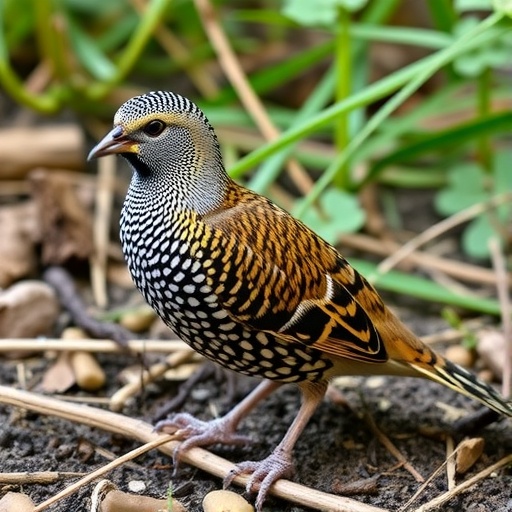In a groundbreaking study, researchers have explored the potent effects of biochar derived from Prosopis farcta, a native plant, revealing its remarkable ability to neutralize aflatoxin B1, a potent mycotoxin known for its adverse health impacts in poultry. This compelling work, published in the journal Discovery Animal, presents an innovative avenue for enhancing avian health and productivity, particularly in quail farming. Given the rising concerns over food safety and animal health, these findings may contribute significantly to sustainable agricultural practices.
The study highlights the pervasive threats posed by aflatoxins, which are toxic compounds produced by certain molds that contaminate a wide range of crops, including grains and nuts. Aflatoxin B1 is recognized as one of the most carcinogenic aflatoxins, posing severe health risks not only to poultry but also reflecting in the safety of meat and egg products consumed by humans. The deleterious effects of aflatoxin B1 on avian health include liver damage, reduced immunity, and compromised growth, underscoring the urgent need for effective mitigative strategies.
At the core of this research is the application of biochar, a carbon-rich product obtained through the pyrolysis of organic materials. The authors, led by M. Raz, conducted a series of rigorous experiments to assess the effectiveness of Prosopis farcta biochar in ameliorating the toxic effects of aflatoxin B1 in quails. The team utilized a range of methodologies to evaluate the physiological responses of the quails exposed to aflatoxin in the presence and absence of biochar, providing a comprehensive understanding of biochar’s role as a detoxifying agent.
An exciting aspect of the study is the formulation of biochar as a dietary supplement. When incorporated into the feed of quails, the biochar significantly mitigated the harmful impacts of aflatoxin B1, resulting in enhanced growth rates and improved overall health indicators. This dual capability of the biochar to neutralize the toxin while simultaneously providing nutritional benefits opens new frontiers in animal husbandry, aligning with the goals of sustainable livestock production.
Moreover, the research underscores the ecological importance of Prosopis farcta, a plant that thrives in arid regions, making it a viable candidate for biochar production. The study highlights the potential of using locally available resources to produce biochar, consequently reducing dependence on imported feed additives and fostering local agricultural economies. This approach not only addresses immediate health concerns associated with aflatoxin contamination but also exemplifies the principles of circular agriculture, where waste products can be transformed into valuable resources.
One of the intriguing findings of this study is the underlying mechanism by which Prosopis farcta biochar interacts with aflatoxin B1. The researchers postulate that the porous structure and high surface area of the biochar facilitate the adsorption of aflatoxin molecules, thereby reducing their bioavailability and preventing their toxic effects on quail physiology. This revelation contributes to the burgeoning field of mycotoxin research and informs future investigations into biochar’s applications across different animal species and agricultural systems.
Furthermore, the implications of this research extend beyond poultry. The successful use of biochar in quail production may serve as a template for other livestock sectors, paving the way for strategies that combat mycotoxicosis across different animal species. The versatility of biochar could enable broader applications in various farming practices, particularly in regions where mycotoxin contamination poses significant challenges.
This study’s findings are particularly timely, as the global food system faces increasing pressures from climate change, food safety crises, and the need for sustainable practices. By integrating innovative solutions such as biochar into livestock diets, farmers can enhance resilience against the threats posed by mycotoxins, thereby promoting both animal welfare and food safety. The adaptability of Prosopis farcta and its derived biochar offers a promising path toward achieving these goals.
The authors advocate for further research to optimize biochar formulations and explore concise feeding strategies that maximize its benefits while minimizing costs. Furthermore, understanding the long-term impacts of such dietary interventions on productivity and health in poultry will be essential for achieving sustainable outcomes in animal agriculture.
In closing, this research opens new avenues for combatting one of agriculture’s most persistent challenges—mycotoxin contamination. With the demonstrated ability of Prosopis farcta biochar to neutralize aflatoxin B1 effectively, the study not only addresses urgent health concerns in quail production but also heralds a new era of environmentally conscious agricultural practices that prioritize both animal and human well-being.
As the study is slated for further exploration, its findings resonate with the pressing need for innovative solutions in modern farming. With this pioneering approach, researchers and agricultural professionals are encouraged to collaborate in harnessing the potential of natural resources to enhance food safety, animal health, and farm productivity. The prospect of using biochar as a dual-purpose agent against aflatoxins and as a nutritional supplement could set new benchmarks for best practices in livestock management.
In conclusion, the potential of Prosopis farcta biochar extends far beyond quail agriculture, echoing the demand for sustainable, health-focused interventions within the broader scope of food production. As the agricultural community continues to tackle the complexities of modern farming, this study serves as a clarion call for innovative approaches that champion both animal welfare and environmental sustainability.
Subject of Research: Neutralization of Aflatoxin B1 in Quails Using Prosopis Farcta Biochar
Article Title: Correction: Prosopis farcta biochar neutralizes aflatoxin B1 and enhances health and productivity in quails.
Article References:
Raz, M., Bagherzadeh-Kasmani, F., Karimi-Torshizi, M.A. et al. Correction: Prosopis farcta biochar neutralizes aflatoxin B1 and enhances health and productivity in quails. Discov Anim 2, 34 (2025). https://doi.org/10.1007/s44338-025-00082-x
Image Credits: AI Generated
DOI: 10.1007/s44338-025-00082-x
Keywords: Biochar, Aflatoxin B1, Quails, Sustainable Agriculture, Animal Health, Prosopis farcta




